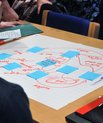Niels Skipper receives DKK 3.1 million from Independent Research Fund Denmark
Professor of Health Economics Niels Skipper will examine whether insulin pumps increase or decrease social health inequalities among children and young people with type 1 diabetes. Independent Research Fund Denmark granted DKK 3.1 million to his research.

Do new technologies, such as the insulin pump, reduce or increase health inequalities? This is a question that Professor Niels Skipper now has the opportunity to investigate further after receiving DKK 3.1 million from Independent Research Fund Denmark for his project Advancements in medical technology and disparities in health.
The objective of the research project is to examine the correlation between health inequality and the use of assistive technology, with particular focus on diabetes and insulin pumps.
Joining him on the project is Assistant Professor Peter Rønø Thingholm from the Department of Economics and Business Economics at Aarhus BSS, Aarhus University, as well as Tine L. M. Eriksen from VIVE, Amanda Gaulke from Kansas State University, and Jannet Svensson from Steno Diabetes Center Copenhagen.
“I’m delighted to have received this grant, as it will enable our research group to continue our work on understanding the sources of health disparities among children and adolescents. With the current grant, our primary focus is to investigate the role of technological health innovation. We aim to determine whether they are alleviating or exacerbating health disparities across the socio-economic distribution," says Niels Skipper about receiving the grant.
Find out more about the project
Using Danish register data and a quasi-experimental study design, the researchers will first estimate the effect of using insulin pumps on diabetes-related health outcomes for children and young people with type 1 diabetes in Denmark. They will take advantage of the fact that there are difference across paediatric departments in Denmark with regard to the use of insulin pumps.
They will then examine the significance of new treatment technology on differences in diabetes-related health, and answer questions such as: Do new technologies, such as the insulin pump, reduce or increase health inequalities?
Understanding the relationship between disease, access to treatment technology and socioeconomic status is complicated as falling ill is often linked to socioeconomic status in the first place. The researchers will take advantage of the fact that there is equal access to the healthcare system in Denmark (in principle), no user payment for treatment equipment, and the fact that type 1 diabetes is not linked to social background. The researchers can therefore use the results from the first part of the study to see whether the allocation of insulin pumps will increase or decrease social inequality in health among children and young people with type 1 diabetes.
Further information
- The grant is part of Independent Research Fund Denmark's new theme “Strengthening research into vulnerable children and young people".
- Read press release from Independent Research Fund Denmark
- Read more about Niels Skipper and his research on his PURE profile
- Read more about Peter Rønø Thingholm on his PURE profile









